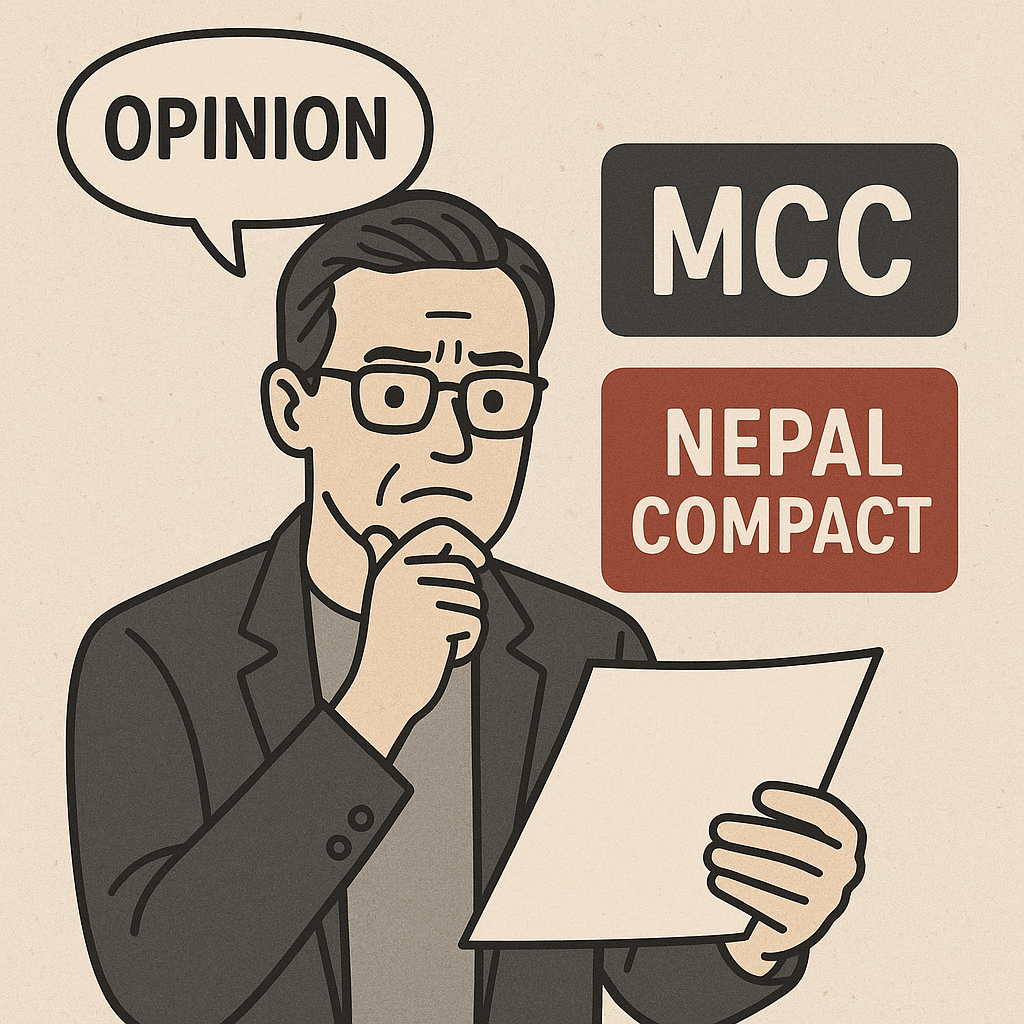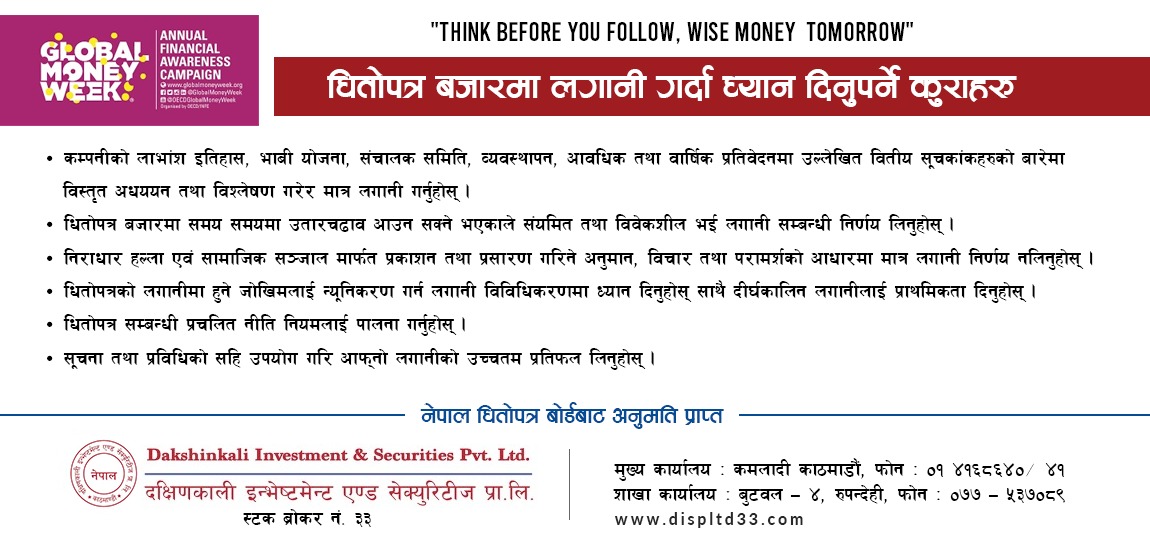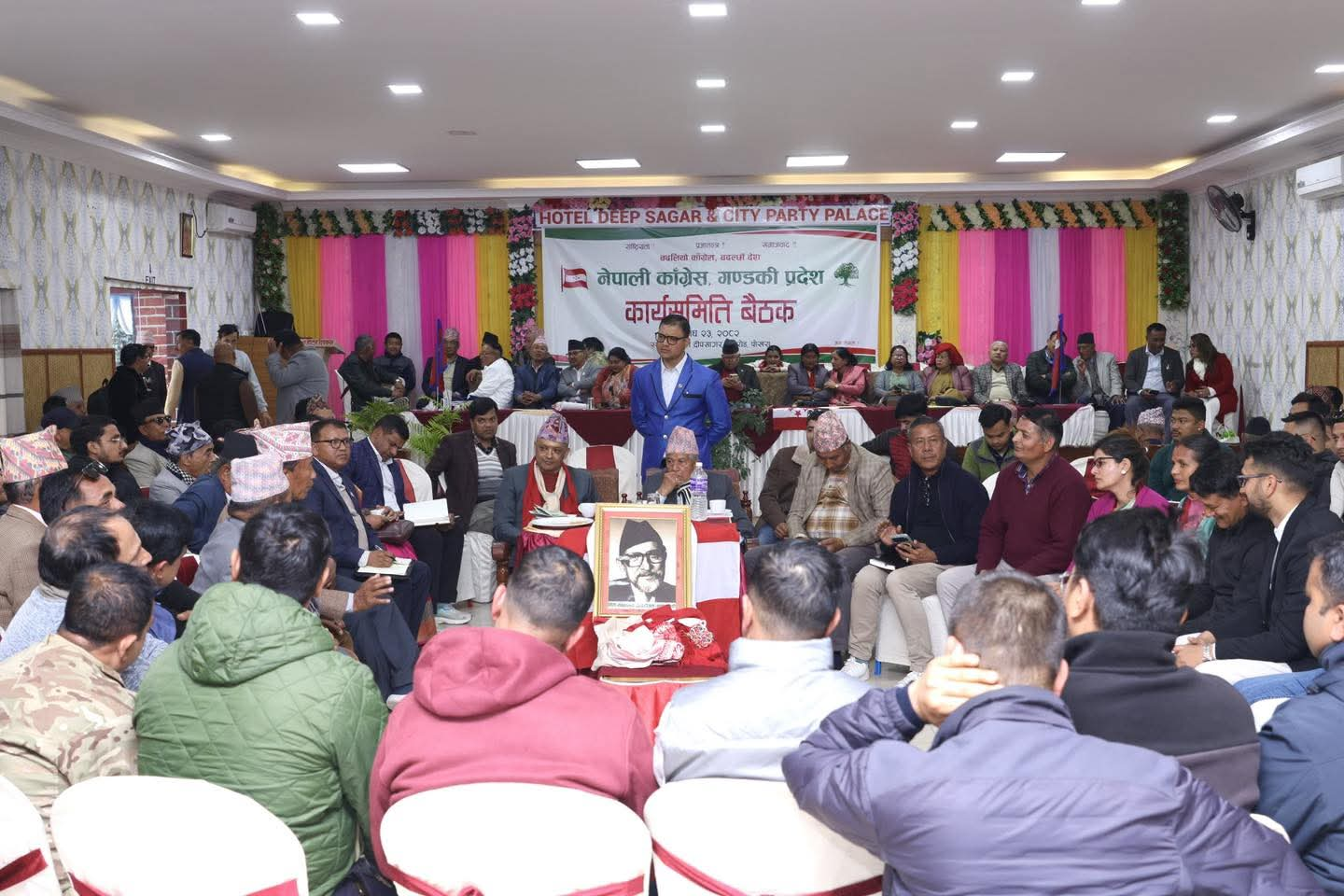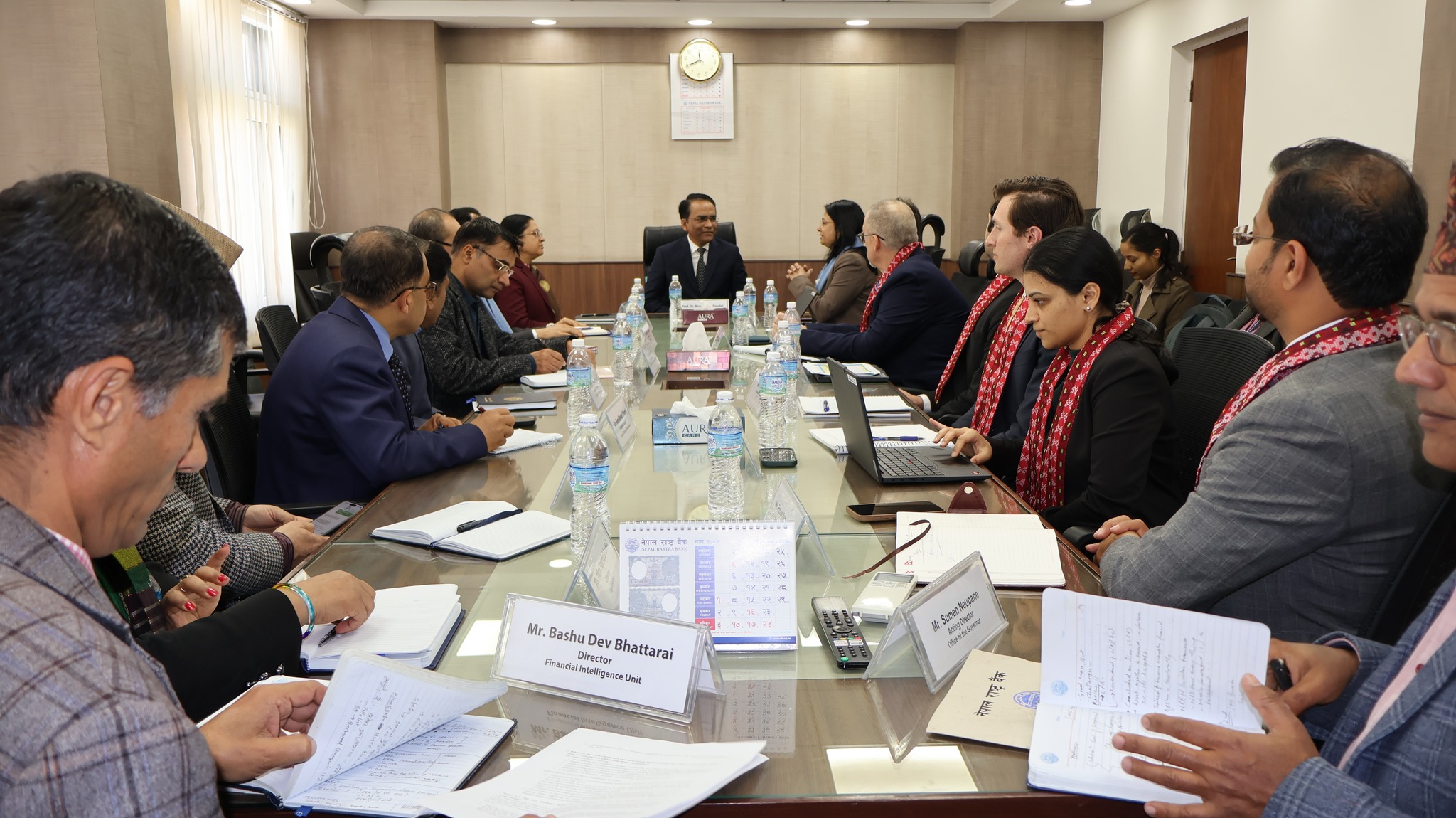MCC or Misguidance? Time for Clear Thinking, OPINION of Amaraj Rai
- Amaraj Rai
- 2025 Jun 13 19:39

INTRODUCTION
What is MCC?
MCC in full is: Millennium Challenge Corporation. It is another American aid agency, like the USAID, but with a difference. MCC was founded in 2004 - USAID in 1961. USAID is old, slow, and cumbersome. MCC is young, energetic, lean and nimble. It's works independently from other government agencies. It is streamlined to work with fewer bureaucratic red tape interferences. The aim is to get things done faster without much hassle and corruption.
In September 2017, MCC and Nepal signed a bilateral compact. The compact/agreement requires MCC to work in tandem with aid receiving country, with a fixed budget provided by both countries, within a time-limit of 5 years.
The compact is a program to enhance, Extension and Transmission of Electricity and Road Maintenance regime in Nepal, with a total budget of $630 million. The budget is to be shared by the governments of the U.S.A. and Nepal.
Since, it is an aid from America (from here on, I'll be using the word America to mean the U.S.A.) MCC is to provide $500 million and Nepal is to contribute $130 million.
The contribution of Nepal is to show Nepal's commitment to the compact and also for Nepal to be an active sharing partner of the program.
The compact requires to be ratified by Nepal's Parliament.
The MCC and Nepal Compact has taken the center stage in Nepal's politics. Whether the compact will be ratified or not by Nepal's parliament, is still a big question mark. Certain elements of Nepali politics are aggressively condemning it.
The first Parliament Session to ratify it took place in December 2021. It did not go well. The Compact is 4+ years old. It's taking a long time for a signed compact to take effect. The delay is mainly due to the bickering of Nepali politicians.
In the meantime, MCC is waiting patiently from afar. But its patience seems to be wearing thin. It has hinted that it will wait for another 3 more months for Nepal's politicians to sort out their differences and ratify the compact.
After 3 months, if Nepal is still undecided, MCC will move on and offer its assistance to another deserving candidate country.
I found this subject not only interesting but crucial to Nepal and Nepalis. I thought the subject, deserves a more in-depth thinking and study than just a quick emotional answer of Yes or No. So, I did a brief armchair research of my own, for a couple of days.
It resulted in this 7-page rambling essay. In it, I'll try to share my thoughts, views and interpretation of the information I gleaned from my research (using the internet) - and express my personal opinion, and present my conclusion.
MY RAMBLINGS, LOGICS, REASONING, AND ANALYSIS
The MCC and Nepal Compact issue has not been resolved as I write this essay. The unfinished ratification needs to be done sooner than later. Or, Nepal will lose a golden opportunity.
Like, in most cases of Issues and proposals discussed and debated in parliament, there will be mainly three groups: Yea-sayers, Nay-sayers, and Fence Sitters.
In addition to these groups, sometimes there could be other groups. Some with ulterior motives. They will be not inside the parliament but outside on the streets protesting, or, sometimes supporting the issue as it is being discussed, deliberated, and voted. These groups will carry provocative or supportive placards, and aggressively shout loud catchy slogans to intimidate or encourage participants taking part in the session.
Such groups are often organized and funded by political parties, or other shady entities that have money and hidden agendas. Hidden agendas which do not necessarily benefit the country but, the organizers. Quite a number of those people on the streets will be hired hands, who have very little knowledge about the issue. The hired hands are mostly less informed or deliberately misinformed traditional-conservatives, who are unsure and afraid of changes.
They are led by shrewd persons with excellent talking skill. These eloquent speakers present themselves as patriots. They use emotion starring words like treachery, betrayal, sellout, and agents against those with whom they disagree, to confuse, mislead and raise doubts and fears in the hearts of the general public. This happens, has happened and will happen again.
As politicians squabble over the issue, and public chant slogans and agitate on the streets, America wonders and waits. India and China watch with amusement.
India vs China why they matter
India and China are our two huge neighboring countries, which have stark political and cultural differences. China is a modified Communist country to the north, and India a messy Democracy to the south. Not only that, they differ in looks, and outlooks.
Indians are mostly big-eyed, pointy-faced and usually brownish in color. Chinese are slit-eyed, flat-faced, and somewhat creamy colored. India is inward looking, old fashioned, and mired in myths and mysticism. While, China is outward looking adaptable and ready to change, if need be. They do not get along with each other. China and India have fought several battles over border incursions and land claim disputes,
Whether you agree or not, India is not an attractive showcase for democracy. India still clings to its outmoded ancient ways. While, China wants to learn and change with time. China is proving that communism mixed with controlled capitalism, and a dab of democracy can flourish when led judiciously by competent leaders. China is doing exceptionally well after the demise of Mao Tse Tung. Since then, China's foreign policy has deviated considerably from pure communist doctrines. China has progressed in leaps and bounds, because of that. It's proving to be a strong competitor for America.
Conversely, Indians had been with the British for some 200 years. They were directly under them for some 100 years. They learned about Democracy and the parliamentary system from them. India has been practicing it over 70 years, since it independence in 1947. Yet, India has not still fully grasped the concept of Democracy. India and Nepal have almost 95% of cultural traits and traditions in common with each other.
Indo-Pacific Strategy Hullabaloo
India's slow development of Democratic principles is concerning. It has an unchecked staggering population of 1.35 billion, poised to overtake China's 1.4, within 5-6 years. America is concerned that India the largest Democracy in the world does not get carried away by China's success story and succumb to the Chinese Model. Maybe, I'm stretching my imagination a bit far here. Hence, we occasionally hear some American politicians and high ranking officials casually mention that MCC is a part of the IPS (Indo-pacific strategy) in a vague manner.
I think, what they mean when they say this is: America is not oblivious to China's influence and expansion in that region, and India's declining and messy application of Democratic values. Besides, India prefers Russian Arms and equipment to America's. Maybe that's because Russian's are cheaper! Anyway, I do not believe America will turn Nepal into a battle ground, or a no man's land by fortifying it. China will not fight America. China just wants to aid and trade with other countries.
America is more interested in the Pacific rim than in the Himalayan Region. MCC aid, America hopes would stem China's influence in the region by countering China's ambitious program BRI.
What is BRI in brief?
BRI stands for Belt and Road Initiative. It is the brain child of Xi Jing ping, the present leader of China. It was formerly known as One belt One Road. BRI was founded in 2013, but it's already making a big a splash in the global geopolitics. It's certainly making America edgy.
My understanding of the purpose of China's BRI project is to extend China's trade and commerce with other countries, by building roads, bridges, dams, airports, ports, power plants, railways.... It's not to facilitate the transportation of army, tanks, air force, and naval ships to invade a country.
China's BRI is China's foreign policy strategy too. Its aim is to build partnerships with other countries by offering them something for something.
BRI is: “You scratch my back and I will scratch yours” policy. China doesn't use bombs and missiles to make others submit to its wills and ways. They negotiate.
Will America use MCC to subjugate Nepal?
To me, it's almost unimaginable that America will send American boots on the ground, let alone, send fighter jets, bombers, and drones to strafe Nepal with missiles, using the MCC Compact as an excuse.
Or, play the debt trap game with a small, poor, and debt-ridden country which is struggling to keep its head above the water.
How would America look in the eyes of the world if it turns Nepal into Vietnam, Afghanistan and the rest? Nepal is not a country ruled by a king, dictator, autocrat, military junta, or religious fanatics. It's a secular Federal Democratic Republic just like America, and India.
Nepal adopted this form of government only 13 years ago. It's a fledgling in this regard; a novice who is trying to learn the ropes of a new system. Nepal needs lots of help at this stage. This factor perhaps played a considerable part in selecting Nepal by MCC.
Be informed, Nepal is not the only country chosen by MCC. There are more than 30 other countries which have received, are receiving MCC's assistance. These countries have not cried Foul against America!
There are others which are waiting and hoping that they will be chosen next. MCC uses tough criteria to select candidate countries it wants to assist.
The fact, that Nepal is selected from so many candidates is a pat on the back, and a blessing for Nepal.
It's hard to believe that MCC aid is a cunning plot cooked up by America to subjugate poor countries.
America is not an evil empire as its enemies like to call it. America fights for DEMOCRACY, FREEDOMS, AND HUMAN RIGHTS.
The Elements
Some of you may be aware, inside and outside the country, there are elements, who oppose Nepal's new system of Government. They will do everything in their power to disrupt it, and not let it grow into a strong, confident, and a functioning system. These elements will find excuses, or make excuses that will create fear, discontent, unrest, and fictionalized the country.
Their aim is to make the new system look bad, inefficient, and kill it, while it's still in its infancy. Their objective is to bring back an old and outdated system, and rule the country by a small exclusive group of families, friends, and associates, who will be more equal than the others.
These elements will attack MCC and America using media like: YouTube, Facebook, news papers and whatever they can use to spread lies and propaganda. Their intention is to make America look horrid and evil. Don't fall for it.
We must not forget Nepal fought 10 years of civil war that cost 20 thousand lives to get the present form of government. America was not involved in that war. China was quiet. India on the other hand was a suspect.
NEPAL'S PROBLEMS AND SOME QUESTIONS
Nepal is a small landlocked country lodged between two giants, who look each other with suspicious eyes.
Two thirds of Nepal's lands in the North are, not suitable for modern agricultural technique. These lands do not produce much food.
Terai, Nepal's breadbasket in the South, where struggling hillmen are migrating to, is getting more and more crowded day by day.
A huge area of Terai land which were once used to grow rice and vegetable are now dotted with houses and constructions. This unfortunate transformation taking place in the Terai, accompanied by population growth, are happening at a rapid rate. Nepal does not produce enough food to feed its burgeoning population nearing 30 million.
On top of these issues and quandaries we have, wily men with ulterior motives, and oratory skill confusing fellow Nepalis. They give fancy speeches, and produce misleading and manipulative videos, to urge Nepalis to refuse aid from well meaning donor countries.
They accuse powerful countries of trampling on our Constitution, Sovereignty, Patriotism, and Nationalism. They portray themselves as the protectors of Tradition, Culture, Religion, and the Country.
Now, these are emotive words. The concepts they represent are weighty and worthy. No doubt, such words boost one's ego and pride; but are they warranted and relevant in Nepal's situation?
Are unchecked ego and false pride more important than safer roads, surplus energy, improved economy, more food, and less stressful life for Nepalis?
What is the Government to do, when more than 1/5 of the population especially in the hills and mountains live from hand to mouth, are malnourished, and some of them on some nights, go to bed in half-full stomach?
Should we feel proud, when Nepalis leave in droves to seek employments abroad just to survive, and feed their families - to seek better opportunities, to escape a relentless and hard wretched life?
Are we to look the other way, and give token sympathy when some of the migrant workers' bodies return home in coffins?
These rhetorical questions require deep thinking and careful considerations. They need hard decisions and bold actions from our politicians and administrators.
Blaming and slandering others, using emotive words, taking to the streets spewing out condemning speeches, and staging protests do not help Nepal or Nepalis.
Accusing some politicians of owning 10 homes,10 cars and making tons of money through corruption, and hiding the money in some safe haven banks outside Nepal - and a list of other misdeeds are serious accusations and issues. But, are the accusations true, and can be proven?
Even if they are true, these are not issues related to MCC's aid to Nepal. If true, the culprits should be brought to justice using the justice system of the country.
MCC and Nepal Compact, and Corrupt Politicians are two different issues altogether, therefore, they should be dealt with separately. What the elements are creating with these issues is the Straw man Fallacy.
MY CONCLUSION
In my opinion, Nepal and Nepalis need any big or small help they can get that will uplift their lives. To say offhandedly “NO MCC” is a rash and irresponsible thing to do. Honest and hard working Nepalis deserve better - not misleading slogans and enticing hollow words. Examine the speakers' speeches, points, and their motives, then make your own judgment. Don't just follow the crowd. Fellow Nepalis, I beseech you to study the issue with a sober mind and think prudently in a practical manner.
MCC and Nepal Compact is good for Nepal and Nepalis. An opportunity like this comes very rarely.
America will not harm Nepal.
P.S.
What I've presented here are my own thoughts and opinion. I am aware that many will not agree with me. It's alright to disagree, discuss, and debate, so as to understand more, and to come out with a better solution.
This is a message to counter the spreading of lies and propaganda by the ELEMENTS. If you agree with this message, Please, spread it around to warn our innocent fellow Nepalis.
Comments are welcome.
Thank you.

![$adHeader[0]['title']](https://www.bfisnews.com/images/bigyapan/1759825227_1100x100.gif)















.jpeg)



.jpg)




प्रतिक्रिया